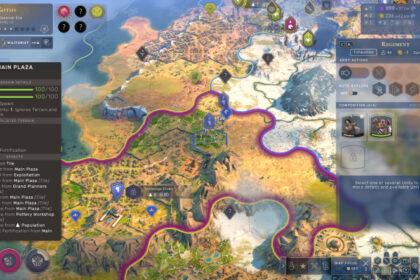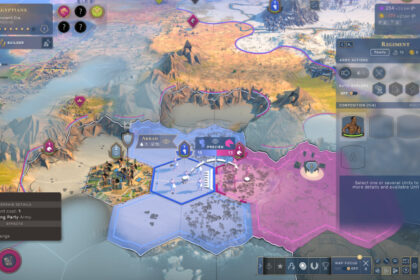Humankind is a 4x game, and therefore exterminating other players — in its case, Empires — is part of the game. However, you can’t just go guns blazing on your adversaries in this game.
Unlike many other Strategy games, there is a lot of logistics, diplomacy, tactics, and preparation matters to be dealt with for a player to go to war. All that happens way before the first battle.
Players cannot declare war against another Empire unless they have enough War Support to do so, and that’s not always the case.
When your population is not happy with a relationship with other Empires, you will earn War Support. War Support can be found at the top of a player’s Diplomacy Screen when checking other Empires.
War Support is a form of relationship measure in Humankind, meaning that it changes from Empire to Empire. So if you have a lot of War Support against the Japanese Empire, it does not mean you will have War Support against the Egyptians.
Although War Support is obtained when the population isn’t exactly satisfied with how things are turning out between two Empires, it is not clear to many players exactly how the War Support value goes up.
So if you want to know how to get War Support in Humankind, this is the guide for you.
How to get War Support

There are plenty of ways to increase War Support in Humankind. Usually, War Support is a passive thing, and it happens as a consequence of another Empire’s actions. However, there are actions that will instantly boost your War Support against other Empires.
A good way to create War Support is by creating grievances between Empires. Players can achieve that in many ways. For instance, converting another Empire’s city into your religion is most likely going to cause a grievance between the two Empires.
Demands can also increase your War Support against another Empire, and it might be easy to take advantage of that. When demands are not met, you can go to war until the other Empire drops their demands.
It is quite hard to diminish War Support in this game, so as long as there are Demands and Grievances between two Empires, chances are War Support will keep rising.
How War Support Works

The maximum War Support an Empire can have is 100. Generally, in times of peace between Empires, the War Support slowly decreases and balances itself out around 50 for both sides.
Any number that is higher than 50 will be slowly decreasing in times of peace, even if something made it grow recently for any reason.
Although it is hard to diminish War Support, Empires at peace are able to do it. There are Diplomatic actions that will cause the War Support to be lowered.
Signing Treaties with another Empire will cause the War Support to decrease by 5 instantly. Another way to have a -5 to the War Support value is by starting an Alliance with another Empire.
Alliances are a significant way of lowering War Support. For instance, Allied Empires will end up having a War Support Equilibrium of 20.
Pre-Alliance Treaties that were signed by Empires will cause their War Support equilibrium to average on 25. Alternatively, Alliance Treaties will cause the War Support to go all the way down to zero.
Please note that Alliances are not easy to make in a game where all Empires are competing against one another.
There is also the fact that it is hard to make alliances when you have Influence battles going on. 4x games are highly complex, and there are many small things that can change how you should play the game or deal with a competitor.
Formal War and Surprise War
Considering that War Support means your population is not happy about some other Empire, it can be used to justify going to war.
By going to the Relation Tab, players can openly Declare war against another empire. They can also go to war secretly by selecting Surprise War.
Surprise War

“If you are absolutely must have war, so be it.“
This is what happens when a war occurs without a proper amount of War Support. Surprise Wars can be started as soon as your War Support reaches 20. There are many issues that it creates, though.
For instance, the Empire that has started this Surprise War will receive a penalty of -2 War Support for each turn that the war is happening. This penalty is called Declaring Unjust War.
Surprise Wars will also mark you with a Traitor Reputation Badge. In fact, you gain one level on this badge for each Surprise War that you have declared.
A Traitor Reputation Badge will cause the other Empires to earn more War Support when they win a battle against you. It can also change the Attitude of other Empires and affect your diplomacy negatively.
So keep in mind that although Surprise Wars might give you a slight advantage, it is a hard move to pull out, and it can be really bad in the long run. You will lose War Support rapidly, and other Empires will not be willing to trust you anymore.
Formal War

“Resolve this argument by force; crush the other Empire’s War Support until they abandon their Demands and accept yours.“
This is the kind of war that happens when your War Support is high. In order to use the Declare War button — which causes you to declare a Formal War — the War Support must be at 80 or higher.
Players should be aware that Militaristic Cultures have +30 War Support Equilibrium. Even in a situation of peace — where the War Support should be 50 to each Empire — a Militaristic Culture will have 80 War Support and will be able to declare a Formal War suddenly.
The significant advantage of a Formal War is the fact that by declaring war this way, your relationship with Empires that aren’t involved with the war will not be affected.
Fighting and Settling

War changes how relationships and diplomacy work between Empires. In fact, there isn’t much room for diplomacy at all. Unless Empires have a Trade at War civic, treaties and Trades will not be functioning as they usually do.
War Support will also behave differently since once war is declared, Demands and Grievances will not grant War Support to any of the involved Empires. The only way to raise that value will be by winning battles.
The player’s objective during a war is not to obliterate the enemy, it is to make them lose War Support. That can often be performed with a weaker army in a well-defended Territory.
There are many strategies to survive a war, and they are even more effective during Surprise Wars since the Empire that has declared it will constantly be losing War Support.
Once an Empire’s War Support reaches zero, the war is over. The Empire is forced into Surrender, which usually means paying for the war and possibly giving up a few Cities.
War can also end once White Peace is accepted. However, it is less likely than just depleting the adversary’s War Support.
If both Empires had Unsatisfied Demands, White Peace could be proposed as a way to end the war. The proposal involves both Empires abandoning their Demands to end the conflict on the battlefield — no winner, but also no losers.
Empires that do not see any advantage in fighting a war can also just go ahead and surrender. That might diminish their losses, but the other Empire must accept the terms proposed.
However, having your War Support completely drained will force you into Surrender no matter what. In that situation, you cannot propose the terms of your Surrender; the winning Empire is the one to define the terms.
Losing Empires must accept the terms imposed and are also obligated to abandon all their Demands and Grievances.
Best Cultures For Fighting Wars

Some cultures have clear advantages in each Era due to their Legacy Traits and Emblematic Units. However, there are many out-of-the-box combinations that work depending on the context of each game.
There are many valid tactics, and you might want to accumulate certain Legacy Traits that give you a competitive edge on battles, but you should not forget about having enough Money, Industry, and even People to back up your war efforts.
Certain combinations of Legacy Traits can make your army an unstoppable force. For instance, combining the Assyrian’s and the Goths’ Legacy Traits might make you unstoppable when ransacking enemy tiles.
Others might make you good at both making money and defending your Territory.
There are many possible and valid tactics here, which is why Humankind is very repayable. These are some of the Legacy Traits per Era that provide a clear advantage on wars.
Ancient Era
The Assyrians’ Raid Masters Legacy Trait grants them +1 Land Movement Speed on Unit and +5 Combat Strength bonus when Ransacking on Army.
The Hittites have a Legacy Trait that grants +1 Combat Strength, which will always be useful.
Classical Era
The Goths have +10 Combat Strength from Ransacking on Unit and +2 Influence on Garrison, while the Huns’ Formidable Steeds give them +2 Combat Strength on Cavalry Units.
Medieval Era
The Norsemen have +3 Naval Movement Speed and +2 Combat Strength on Naval Units. It might not be helpful for all tactics, but it is really strong for dominating the seas.
Early Modern Era
The Ottomans have a Legacy Trait that is clearly designed to make them stronger in longer wars, giving them -50% on Heavy Weapon Industry cost and +3 Strength Combat Strength on Heavy Weapon.
The Spanish’s Honor and Glory Legacy Trait is also interesting since it gives you +3 Combat Strength on Units starting their turn in a non-allied Territory. It is not the greatest for defending your own land, but you are more worried about invading if you intend to go to war.
Industrial Era
Germans’ Iron Ordnance gives them +3 Combat Strength to Naval and Air Units. It also makes the Industry cost of Units 20% cheaper, which comes in handy when producing Airplanes and Ships.
Contemporary Era
In the contemporary Era, the Soviets are a clear choice for war. They have -20% on Unit Industry cost and +3 Combat Strength on Unit from their Red Tide Legacy Trait. Combining those with all the other bonuses of the above cultures, you will have the strongest units of the game.
Final Thoughts

This should be everything you need to know about wars in Humankind, from gathering War Support to why you should have it.
Now you know that war is much more complicated in this game than it usually is in others, but it isn’t a bad thing.
This is not a game about obliterating the adversaries; it is a game about lifting your Culture to a State that it will be remembered for. It is about leaving your mark in the world, which is how you win a game of Humankind.
War is complicated. It involves risks, demands, it can cost you relationships, and it drains your resources severely. It isn’t always the best call for many Empires, but maybe it is for yours.
Either way, you should know how it works well enough now to decide whether it is worth going to war or not. If you do decide to fight wars, make sure you calculate the risks — especially when going for a Surprise War.
This guide is also helpful in case another Empire declared war on you. Remember, you don’t have to win all fights. Just survive until their War Support ends, or surrender in case you think that you won’t be able to survive at all.






